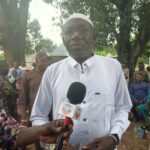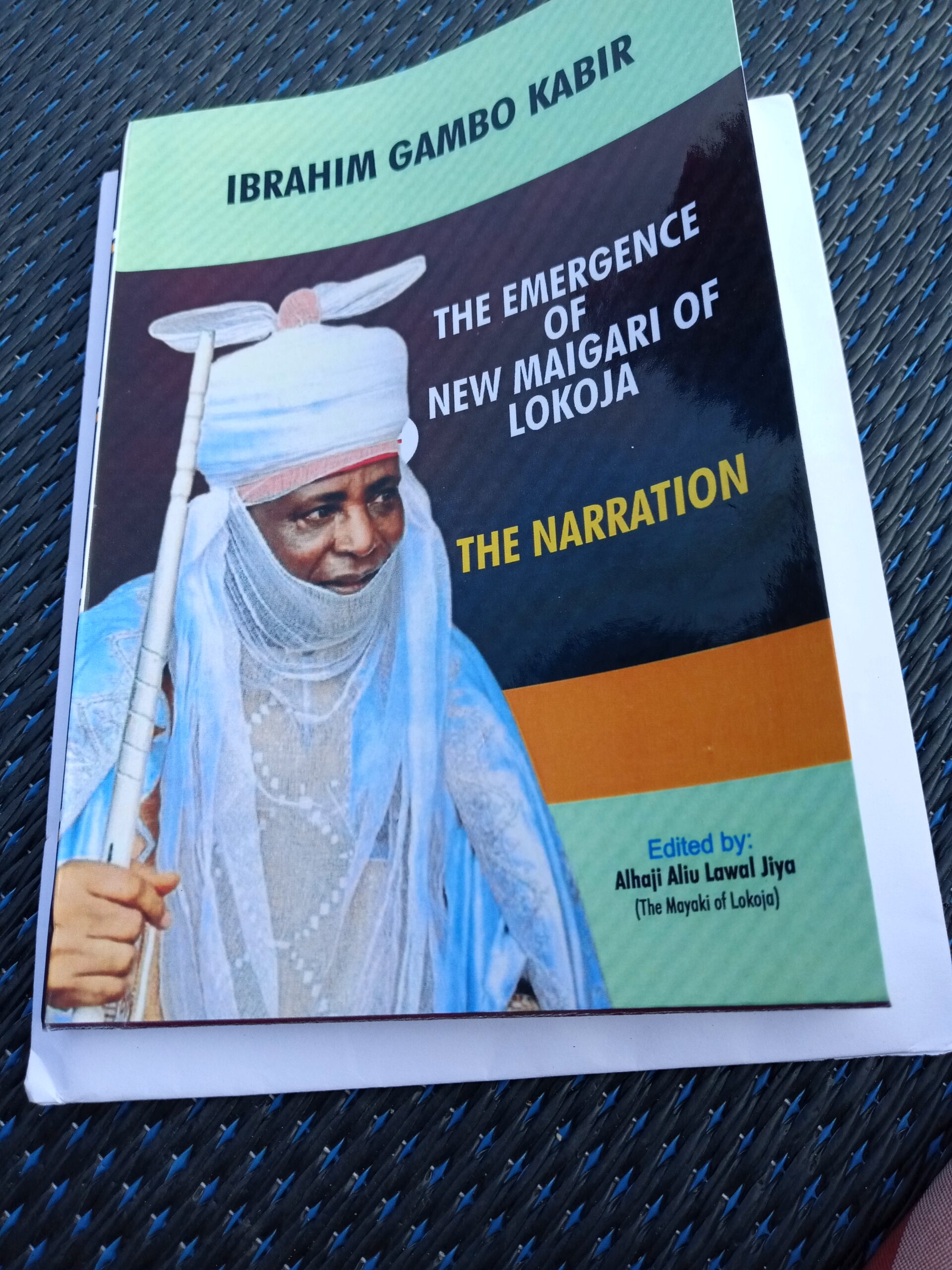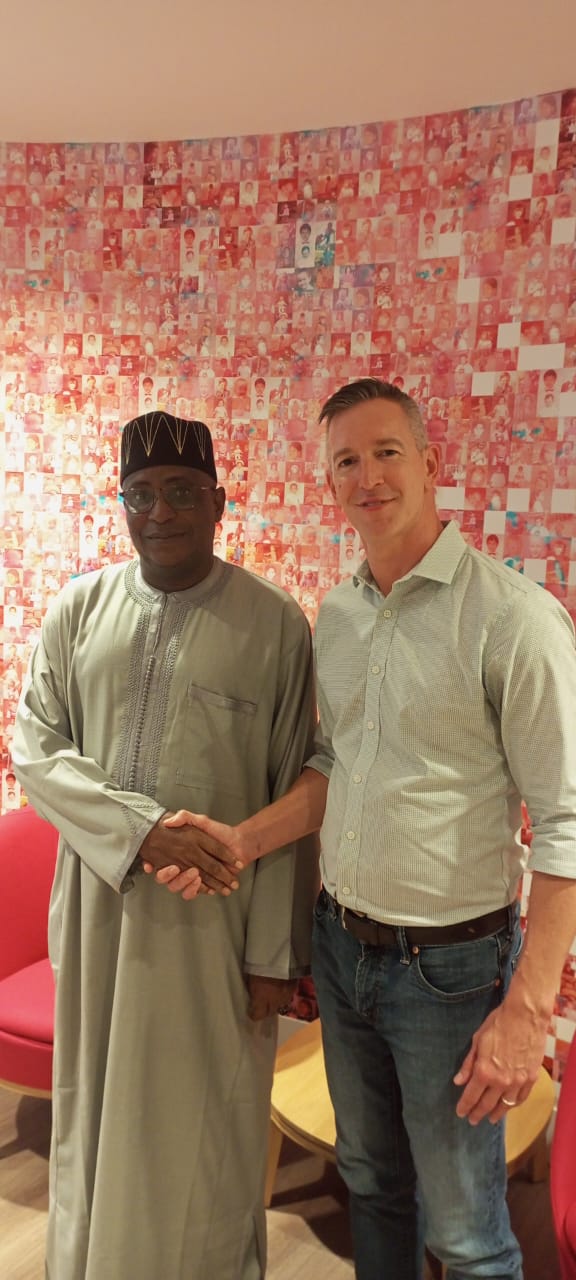
The forgotten cradle of Egbira civilization. It is basically a fishing and farming community, which also had a rich history of iron smelting. But a title holder in the Igwu kingdom said “nobody wants to be a blacksmith these days,” so the huge deposits of iron ore beneath the foothills remain largely untapped.
Sadly, their iron smelting heritage for which they became popular has almost gone into extinction. No single blacksmith was found in Koton Karfe, when our reporter sought to see one.
The Ohimegye of Igwu (Koton Karfe), His Royal Majesty Alhaji Abdulrazak Gambo Isa Koto, said Igwu kingdom is one of the oldest kingdoms in North Central Nigeria, spanning over 400 years.
He proudly said Igwu, which means “enclosure” in Egbira, is the cradle of Egbira civilization, adding that it was the Hausa who called the place Koton Karfe, probably because of the abundant deposits of iron ore around the area.
He said bows and arrows andq spear are the isignia of the Egbira culture because of its rich history in iron smelting and gallantry in warfare. According to him, the people migrated from Yemen and came through Kanem-Borno empire, then down to Kwararafa kingdom.
The Ohimegye said they later left Kwararafa for Idah. “At Idah our leader contested for the throne but lost out. Our leader, Ohemi Ozi Egye, from whom we derive the tittle Ohemigye, meaning Ohemi the son of Egye, became uncomfortable with the selection process and then he left with his people.
Colonialists put this time at 1740 but I think it was earlier than that. We crossed the River Benue to Onyoka, but there was an outbreak of disease and we proceeded.”
He said succession tussle arised later that led to the split of Egbira, with one group going to Opanda, Nassarawa Toto, and the other group then left Ugbaka for Girinya, where they found a new settlement.
The eloquent chief said it was at Girinya that two brothers, Ohemi Oduniya and Ohetenye, went on a hunting expedition and discovered their present location, which he said was very strategic in those days of tribal wars.
During such wars, he said, the people who lived around the Igwu mountains burrowed holes into it, forming caves and veritable hiding places at the time of aggression from external forces.
He explained that the Egbira at Opanda in Nassarawa Toto, Nassarawa State, the ones in Okene and in some parts of Edo State share the same linguistic and cultural affinity, even as there are some dialectal differences.
He gave an example of how the Koton Karfe Egbira is spelled differently from the Okene Igbira, insisting that Egbira history and culture still remains one monolithic core, especially linguistically.
The royal father said it is unfortunate that iron smelting is going into extinction because it has been part of the lives of his people for the past 300 years, adding that warfare instruments like spears, arrows and cutlasses were smelted at Koton Karfe in large quantities and it was a source of economic power for the people.
The Ohimegye promised that he would do everything possible to revive iron smelting, which he said is the heritage of the people. “The amount of iron ore deposit here is far more than what is at Ajaokuta.
Even the content of our water here is reddish because of iron ore,” the chief said.
He lamented that despite the town being an ancient one, and having played its part in the establishment of Nigeria, the hilly, sleepy town still lacks social amenities.
“There is complete absence of social amenities here. The roads are bad,there is no pipe borne water and.yet we are surrounded by water.
There is also lack of federal government presence, apart from the Nigeria Prison Service, which is a colonial heritage. We don’t even have a commercil bank here, despite our strategic location,” he decried.
Another thing that is of great concern to the royal father is the fact that his people’s fishing and farming occupation is being endangered by the dredging of the River Niger.
“We are blessed with fishing ponds and fertile land but the dredging of the River Niger is destroying our fish ponds and farmlands, thereby taking away the livelihood of most of my people,” he said, urging the government to find ways of revitilising the ponds and compensating the people for their lost farmlands.
This reporter observed that the ancient town, with sprawling rusted zinc houses, is divided into two by theAbuja-Abaji-Koton Karfe-Lokoja highway.
The hilly side, with rising and falling landscape forming the centre of the town while the swampy side is an evergreen grove of bananas and sugarcane.
The Ohimegye said while the mountain side provides a good reserve for wildlife, the swampy area, stretching down to the two rivers, provides fertile soil for cultivation of crops and abundant ponds for fishing. Koton Karfe is a historical museum of sorts, steep in historical monuments like the grave of the founder of the Igwu kingdom Ohemi Ozi Egye, and the Esi-Koko caves as old as 400 years.
$4The ancient town exudes an awesome ambience. There are other fascinating sites in and around the.town like the Murtala Mohammed bridge, the Igbade cool water spring, which cascades from a height of over 30 metres and flows gracefully down the River Niger.
The Ohimegye’s palace is an edifice that outsizes the entire town but at the same time depicts the imensity and significance of the old kingdom. Inside it too, there are artefacts that will not fail to thrill a visitor.
“A set of big drums, called tambari, lurks in the corner of the watchtower of the palace and Alhaji Dauda Makaido Madaki, Ondaki Ogbani of Koton Karfe, said the Igwu kingdom type of tambari is unique, adding that in those days when the drums were beaten at nightthen war was on the verge of breaking out.
He however said that nowadays, when the tambari is beaten, it is either on the eve of sallah or to announce the return of the Ohimegye from a journey.
The Ohimegye also said the Igwu kingdom has a cultural festival that is celebrated in December to commemorate the kingdom’s resistance of Fulani invasion. He said the Akuki festival is celebrated every year to show the fighting prowess of the people.
“Nobody conquered us. As blacksmiths, it was easy for us to repel their attacks,” he added. He, however, said that in modern times, Igwu people have co-existed peacefully with Fulani, Hausa, Yoruba, Bassa, Gwari, among others, for the past 300 years. According to him, the Igwu kingdom extended beyond Abaji, which was run like a vessel by the Igwu chiefs but with recent boundary adjustments, the Koton Karfe area has been reduced.
“Initially Koton Karfe was to be part of the Federal Capital Territory (FCT) when it was created in 1975 but we opted out because we don’t want to lose our heritage,” insisting that even now that the old kingdom is still grappling with development, challenges the Igwu people do not regret that decision because they still have their land intact.
The ruler aid by the time colonialists came, the Igwu kingdom was an already established system that was similar to that of the emirate system in the Hausaland.
He said it has been a relatively peaceful kingdom because of the rotational principle operated by their forebears. “Our forefathers included the principle of rotation in the kingdom. The stool of Ohimegye is rotated within two wards and we have eight ruling houses in Koton Karfe,” adding that there are over 200 communities under the kingdom, being ruled by Ohinoyis (village heads).
He said the place is not only the cradle of Egbira civilization, it also produced pioneer teachers in NorthernNigeria and has produced other prominent sons in different disciplines and careers.
He said the late Isa Koto was one of the pioneer teachers in Northern Nigeria who later became an ambassador in the First Republic.
He mentioned other illustrous sons of Koton Karfe, who included General Tunde, Ogbeha, General Chris Ali, former Chief of Army Staff, former Comptroller Gen. of Prisons, Musa A. Egu, the late Alhaji Usman Angulu Ahmed, who was Minister of Police Affairs in the First Republic, Alhaji Liman Umar, former SSG in the old Kwara State, among so many others.
He, however, regretted that since the late Ahmed was made a minister in the First Republic, no Igwu son or daughter has been appointed a minister.
For Muhammadu Shuaibu Tatu, the Ozeremi Ogbani of Igu land, it is regrettable that nobody wants to go into blackmitting again and the age long trade is going into extinction. He said the young consider iron smelting old- fashioned and not a lucrative business to undertake.
He however said that the traditional institution is doing all it can to encourage the practice of the age-long profession of the people inorder to preserve the heritage of the Igwu kingdom.











